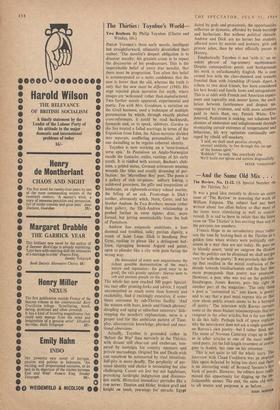—And the Same Old Mix . . .
IT was a good idea recently to devote an entire issue of 'The Review' to assessing the' work of William Empson. The subject had not been written about too often before so that most of the items were stimulating as well as contro- versial. It is sad to have to relate that the latest issue on The Thirties' is less exciting than any of the previous ten numbers.
Francis Hope in an introductory piece rather sets the tone by looking back at the Thirties as a golden time when writers were politically con- scious in a way they are not today. He goes on to blandly assert, 'until we outgrow the illusion that the politics can be dismissed we shall not get very far with the poetry.' It was precisely this mix' up that resulted in the moral confusion of the decade towards totalitarianism and the fact that more propaganda than poetry was produced. However, a poet who was not on the publicity bandwagon, James Reeves, puts this right in another part of the magazine: 'The only thing a poet is "committed to," you know, is poetry and to say that a poet must express this or that view about public events seems to be a betrayal of poetry.' The interview with Reeves corrects some of the more blatant misconceptions that are rampant.in the other articles, but is far too short to do this fully. Perhaps lack of space explains why the interviewer does not ask a single question on Reeves's own poetry—but I rather think not' The name of Norman Cameron crops up in this as in other articles as one of the most under' rated poets, yet the full-length treatment of course goes to Auden, this time on his reticence. This is not quite to tell the whole story. The interview with Claud Cockburn was an inspired idea again defeated by being too short and there is an interesting study of Bernard Spencer's last book of poems. However, the editors have math' missed this opportunity for digging up the un- fashionable names. The mix, the same old mix, to all intents and purposes is as before.
JOHN HORHILK






























 Previous page
Previous page